Darfur Death Toll: http://www.guardian.co.uk/sudan/story/0,,1872978,00.html
Thursday, September 14, 2006
Tuesday, June 20, 2006
It's June 20 -- WORLD REFUGEE DAY -- today. With more than 4.8 billion people living in the 'third world' (countries with high poverty rates, history of colonialism, lack of infrastructure, high population growth, political and civil unrest...etc) it's no wonder the phenomena of refugees is so prevalent.
World Refugee Day -- besides acknowledging the plight of refugees -- doesn't do much in the way of solving these plights. After all, Darfur is a crisis in existence right now.
More on WORLD REFUGEE DAY...
Also, some excellent photography of refugees across the globe...here
World Refugee Day -- besides acknowledging the plight of refugees -- doesn't do much in the way of solving these plights. After all, Darfur is a crisis in existence right now.
More on WORLD REFUGEE DAY...
Also, some excellent photography of refugees across the globe...here
Saturday, June 03, 2006
‘Never Again’?
By: Ali Zafar, One80 Contributor
Published: MAY/7/06
An elderly Darfurian woman sobs, holding her head in despair. Next to her, a sign reads: ‘speak out and stop genocide in Darfur’. This was just one of the many posters held high at Queen’s Park last Sunday, where more than 700 people came together to scream for Darfur. The scream was echoed across the continent with similar rallies held in Vancouver, Washington DC, and San Francisco. The message at the Toronto rally was clear: scream for the 400,000 voiceless people suffering in Darfur.
“We see what’s happening in Darfur and can’t comprehend why this is happening,” said Ben Singer, Financial Director of Project Equity – one of the groups that organized the rally. “We want to scream to show how much pain and suffering we go through when we see our fellow humans suffer.”
Darfur is a region in western Sudan, roughly the size of California. In the past three years, over 400,000 people have died due to the conflict in the region and about 3 million people have been displaced from their homes. The Sudanese government – headquartered in Khartoum, the capital – backed by its Arab militia or “Janjaweed” are attacking and killing “African” people.
“The continuing mass killings, gang rapes of girls as young as eight, village burnings and starvation across Darfur and recently also in Chad, along with the burning of ‘African’ mosques, are motivated by capital ‘R’ racism in Khartoum,” said David Kilgour, former Member of Parliament for Edmonton and Secretary of State for Africa, as he addressed the audience at the rally.
Kilgour was part of a contingent that included NDP Leader Jack Layton, his wife, MP Olivia Chow, and Mohamed Haroun, president of the Darfur Association of Canada.
In his speech, Kilgour outlined a three-point intervention proposal developed by an international group of concerned individuals to deal with the conflict: establish a no-fly zone over Darfur, since many attacks on villagers are done through air raids; Darfur should have its own government; and invite international peacekeepers to protect the civilians.
He added that the conflict is fueled by ethnic and racial tensions – with the “Arabs” attacking the “Africans” – and not religious tensions, since both the warring parties are Muslim. Kilgour said he’s also upset with foreign countries not “willing to stop the slaughter if it involves any risk or burden.” And he isn’t alone.
Dr. Norman Epstein, a medical doctor by trade, is founder and co-chair of Canadians Against Slavery and Torture in Sudan (CASTS). His interest in Sudan was sparked by a presentation he saw on slavery. “Children were being abducted into slavery,” he said during a recent interview. “I couldn’t believe it was occurring, so I decided to do something about it.” And he did by co-chairing CASTS, a grassroots coalition working to raise public awareness of slavery and conflict in Sudan.
Dr. Epstein said countries don’t have a strategic interest in Sudan, so they don’t care for the conflict. He wants Canada to have a greater role in solving the conflict. “We’re asking Stephen Harper to take greater leadership. We’re asking Canada to take up the international lead on Darfur, like it did 20 years ago with apartheid in South Africa.”
He added that the only way politicians will put emphasis on Darfur is if Canadians put pressure on their MPs. “Write to your MP, because when they hear [your concerns], the more likely the prime minister will do what is necessary. This is how democracy works, when we the constituents care, when we the constituents are apathetic, the leaders will be apathetic.”
Recently, there have been talks held in Abuja, Nigeria on finding a peace deal for the conflict between the warring parties – with the African Union, the United Kingdom, and United States acting as mediators. But Dr. Epstein is not satisfied with the lack of Canadian and international intervention in the conflict.
“What’s going on in Darfur is genocide,” he said, adding that “we step up with the natural disasters like the tsunami and Hurricane Katrina.
“Doesn’t Africa matter? I think it does.”
By: Ali Zafar, One80 Contributor
Published: MAY/7/06
An elderly Darfurian woman sobs, holding her head in despair. Next to her, a sign reads: ‘speak out and stop genocide in Darfur’. This was just one of the many posters held high at Queen’s Park last Sunday, where more than 700 people came together to scream for Darfur. The scream was echoed across the continent with similar rallies held in Vancouver, Washington DC, and San Francisco. The message at the Toronto rally was clear: scream for the 400,000 voiceless people suffering in Darfur.
“We see what’s happening in Darfur and can’t comprehend why this is happening,” said Ben Singer, Financial Director of Project Equity – one of the groups that organized the rally. “We want to scream to show how much pain and suffering we go through when we see our fellow humans suffer.”
Darfur is a region in western Sudan, roughly the size of California. In the past three years, over 400,000 people have died due to the conflict in the region and about 3 million people have been displaced from their homes. The Sudanese government – headquartered in Khartoum, the capital – backed by its Arab militia or “Janjaweed” are attacking and killing “African” people.
“The continuing mass killings, gang rapes of girls as young as eight, village burnings and starvation across Darfur and recently also in Chad, along with the burning of ‘African’ mosques, are motivated by capital ‘R’ racism in Khartoum,” said David Kilgour, former Member of Parliament for Edmonton and Secretary of State for Africa, as he addressed the audience at the rally.
Kilgour was part of a contingent that included NDP Leader Jack Layton, his wife, MP Olivia Chow, and Mohamed Haroun, president of the Darfur Association of Canada.
In his speech, Kilgour outlined a three-point intervention proposal developed by an international group of concerned individuals to deal with the conflict: establish a no-fly zone over Darfur, since many attacks on villagers are done through air raids; Darfur should have its own government; and invite international peacekeepers to protect the civilians.
He added that the conflict is fueled by ethnic and racial tensions – with the “Arabs” attacking the “Africans” – and not religious tensions, since both the warring parties are Muslim. Kilgour said he’s also upset with foreign countries not “willing to stop the slaughter if it involves any risk or burden.” And he isn’t alone.
Dr. Norman Epstein, a medical doctor by trade, is founder and co-chair of Canadians Against Slavery and Torture in Sudan (CASTS). His interest in Sudan was sparked by a presentation he saw on slavery. “Children were being abducted into slavery,” he said during a recent interview. “I couldn’t believe it was occurring, so I decided to do something about it.” And he did by co-chairing CASTS, a grassroots coalition working to raise public awareness of slavery and conflict in Sudan.
Dr. Epstein said countries don’t have a strategic interest in Sudan, so they don’t care for the conflict. He wants Canada to have a greater role in solving the conflict. “We’re asking Stephen Harper to take greater leadership. We’re asking Canada to take up the international lead on Darfur, like it did 20 years ago with apartheid in South Africa.”
He added that the only way politicians will put emphasis on Darfur is if Canadians put pressure on their MPs. “Write to your MP, because when they hear [your concerns], the more likely the prime minister will do what is necessary. This is how democracy works, when we the constituents care, when we the constituents are apathetic, the leaders will be apathetic.”
Recently, there have been talks held in Abuja, Nigeria on finding a peace deal for the conflict between the warring parties – with the African Union, the United Kingdom, and United States acting as mediators. But Dr. Epstein is not satisfied with the lack of Canadian and international intervention in the conflict.
“What’s going on in Darfur is genocide,” he said, adding that “we step up with the natural disasters like the tsunami and Hurricane Katrina.
“Doesn’t Africa matter? I think it does.”
AU regrets no deal on Darfur
KHARTOUM (Reuters) - The African Union expressed deep regret on Thursday after two Darfur rebel factions missed an AU deadline to sign a peace deal aimed at ending the three-year-old conflict in Sudan's remote west. more
KHARTOUM (Reuters) - The African Union expressed deep regret on Thursday after two Darfur rebel factions missed an AU deadline to sign a peace deal aimed at ending the three-year-old conflict in Sudan's remote west. more
Thursday, May 18, 2006
Wednesday, May 17, 2006
U.N. resolution clears way for peacekeeping mission in Darfur
By Colum Lynch
WASHINGTON POST
UNITED NATIONS - The U.N. Security Council unanimously adopted a legally binding resolution Tuesday that instructs the United Nations to replace an underfinanced African Union peacekeeping mission that is struggling to halt killing of civilians in Darfur, Sudan. The council threatened sanctions against anyone who impedes peace efforts there.
The U.S.-sponsored resolution, which was approved 15- 0, is aimed at speeding up the transition from an African force of some 7,000 troops to a much larger U.N. mission of as many as 20,000 international peacekeepers. To expedite that change, the council demanded that Khartoum produce visas for U.N. and African Union military planners within a week to travel to Darfur and prepare for the transition.
Senior Sudanese officials have not formally agreed to allow the U.N. to send a new peacekeeping mission in Darfur, citing concerns that U.N. forces may be ordered to arrest Sudanese officials suspected of committing war crimes.
But senior U.N. officials noted that the resolution was adopted under Chapter Seven of the U.N. Charter, which can be enforced through the threat of sanctions or military force.
"Now that the council has spoken unanimously, we fully expect that the U.N. assessment mission will be let in," said the U.N.'s top spokesman, Stephane Dujarric.
Tuesday's action came one day after the African Union foreign minister agreed to hand over authority for its Darfur peacekeeping mission to the United Nations as early as September. U.N. officials, however, said it could take as long as six to nine months to get a U.N. peacekeeping mission up and running.
The Bush administration, which has characterized the violence in Darfur as genocide, welcomed the council resolution as an important step in the international effort to stem the violence there.
John Bolton, the U.S. ambassador to the United Nations, said the United States would "augment our efforts to assist in the transitional planning process, which we can do both through U.S. assets and through NATO where that's appropriate." But he said it is "premature yet to discuss" what larger role for the United States there "might or might not be."
The violence in Darfur began in early 2003, when two Darfurian rebel groups, the Sudan Liberation Army and the Justice and Equality Movement, raided police stations and military outposts. The Sudanese military reacted by arming, training and supporting Arab militia, known as the Janjaweed, who destroyed thousands of villages and drove more than 2 million civilians from their homes. An estimated 100,000 to 450,000 people have died as a result of violence, disease or starvation.
The Sudanese government and the main Darfur rebel group, the Sudan Liberation Army, signed a May 5 peace agreement. But two rebel factions have refused to endorse the pact. The African Union has threatened to impose sanctions on any rebel groups that fail to sign the accord by May 31.
By Colum Lynch
WASHINGTON POST
UNITED NATIONS - The U.N. Security Council unanimously adopted a legally binding resolution Tuesday that instructs the United Nations to replace an underfinanced African Union peacekeeping mission that is struggling to halt killing of civilians in Darfur, Sudan. The council threatened sanctions against anyone who impedes peace efforts there.
The U.S.-sponsored resolution, which was approved 15- 0, is aimed at speeding up the transition from an African force of some 7,000 troops to a much larger U.N. mission of as many as 20,000 international peacekeepers. To expedite that change, the council demanded that Khartoum produce visas for U.N. and African Union military planners within a week to travel to Darfur and prepare for the transition.
Senior Sudanese officials have not formally agreed to allow the U.N. to send a new peacekeeping mission in Darfur, citing concerns that U.N. forces may be ordered to arrest Sudanese officials suspected of committing war crimes.
But senior U.N. officials noted that the resolution was adopted under Chapter Seven of the U.N. Charter, which can be enforced through the threat of sanctions or military force.
"Now that the council has spoken unanimously, we fully expect that the U.N. assessment mission will be let in," said the U.N.'s top spokesman, Stephane Dujarric.
Tuesday's action came one day after the African Union foreign minister agreed to hand over authority for its Darfur peacekeeping mission to the United Nations as early as September. U.N. officials, however, said it could take as long as six to nine months to get a U.N. peacekeeping mission up and running.
The Bush administration, which has characterized the violence in Darfur as genocide, welcomed the council resolution as an important step in the international effort to stem the violence there.
John Bolton, the U.S. ambassador to the United Nations, said the United States would "augment our efforts to assist in the transitional planning process, which we can do both through U.S. assets and through NATO where that's appropriate." But he said it is "premature yet to discuss" what larger role for the United States there "might or might not be."
The violence in Darfur began in early 2003, when two Darfurian rebel groups, the Sudan Liberation Army and the Justice and Equality Movement, raided police stations and military outposts. The Sudanese military reacted by arming, training and supporting Arab militia, known as the Janjaweed, who destroyed thousands of villages and drove more than 2 million civilians from their homes. An estimated 100,000 to 450,000 people have died as a result of violence, disease or starvation.
The Sudanese government and the main Darfur rebel group, the Sudan Liberation Army, signed a May 5 peace agreement. But two rebel factions have refused to endorse the pact. The African Union has threatened to impose sanctions on any rebel groups that fail to sign the accord by May 31.
Friday, May 05, 2006

Peace in Darfur??
ABUJA (Reuters) - The main Darfur rebel faction and the Sudanese government accepted a peace agreement on Friday but two other rebel factions rejected the deal, casting doubt on whether it would end three years of bloodshed. more
photo courtesy of AFP
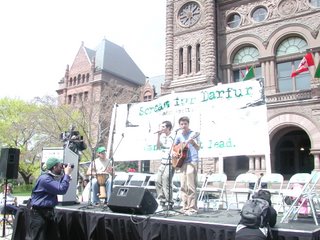
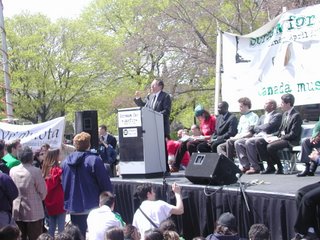
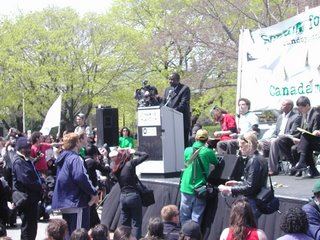
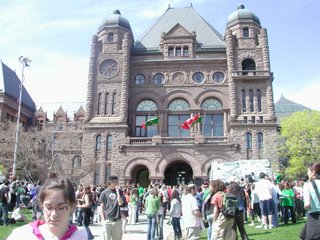
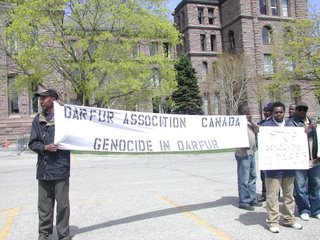
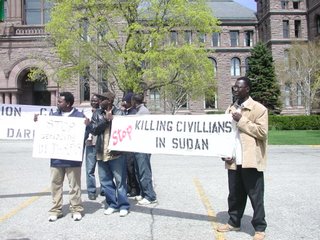 DARFUR ASSOCIATION OF CANADA
DARFUR ASSOCIATION OF CANADA